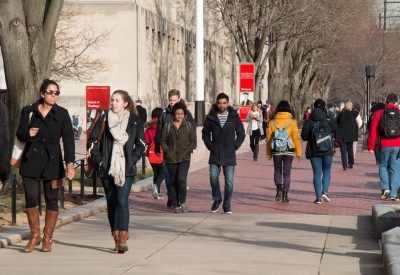
The Boston University Task Force on General Education has submitted a report to the University Council that outlines a vision for the first ever university-wide general education program as the initial step before the program’s scheduled implementation in the fall 2017 semester.
The program, titled “BU Hub,” aims to bring together students from different schools to ensure valuable undergraduate education and prepare students for the real world, according to the task force’s website.
The task force has been collecting the ideas of current students to see what they think can be added to the general education program and what could make it more effective for future students, according to Co-Chair Elizabeth Loizeaux.
“Starting at the very beginning [of] last Spring when we were first start gathering ideas, [students’] feedback has absolutely influenced the vision the report sets out — in fact the idea of the BU Cross-College Challenge came from students, as did the ‘Life Skills’ courses,” Loizeaux, associate provost for Undergraduate Affairs wrote in an email.
The BU Cross-College Challenge, a signature BU Hub program, is deemed to highlight BU’s unique characteristic. Completed either during a student’s junior or senior year, the challenge fosters a collaboration of six students “from across the university” to address current issues through producing “a tangible product” such as a work of art or an exhibition, among many.
“Life Skills” courses would be a two-part offering, one during a student’s freshman year and another in their senior year, the report outlined. The first part aims to introduce students a number of resources for academic and social success at BU. The latter part would focus on professional skills such as basic personal finance and work-life balance.
Aelish Benjamin-Brown, a member of the Student Curriculum Committee, said forming a general education program would dull the different characteristics each college contributes to campus.
“The idea of creating [general education] across all colleges within BU kind of defeats the purpose,” the sophomore in the College of Arts and Sciences said. “The reason that a lot of current students came to BU is that each college has its own nature and culture. I think creating gen ed kind of mutes that.”
Members of the SCC, a newly formed group dedicated to addressing concerns of underrepresented groups at BU, were present at a Feb. 4 town hall-style meeting to discuss the then-developed General Education Program and expressed disagreements with the idea following the meeting, The Daily Free Press reported Feb. 5.
The Task Force had met with faculty members across alumni, staff, BU’s 17 schools and colleges, student groups and the Parent Leadership Council throughout the fall 2015 semester and held additional consultations in the spring 2016 semester, according to the report.
The report will receive additional comments by several councils, such as the Faculty Council and the Council of Deans and faculty members. If approved, a second task force, the General Education Implementation Task Force, will be appointed in the summer or fall and will develop steps for the program’s implementation, Loizeaux noted.
“Like any proposal for a new program, [it has to be] considered and voted upon by the University Council, BU’s faculty governance system,” Loizeaux wrote. “The goal would be … to roll out the full program over the following 4 years.”
Benjamin-Brown said the division of responsibility in implementing the program among different groups is inefficient and could complicate the program’s development.
“The fact that the task force that creates the gen eds will not be the task force that makes the gen eds come to fruition and be implemented seems counterproductive,” Benjamin-Brown said. “You would think the people that are creating the actual program know how it’s going to integrate into each college.”
The new task force seems to forget already existing core curriculums in specific colleges, Benjamin-Brown said.
“In [the] Questrom [School of Business], where they have [Cross-Functional] Core, fitting things in like the Gen Ed Task Force’s proposal of the ‘Cross College Challenge’ where people from different colleges will get together and work on one project … is just not realistic,” she said. “That’s not efficient and not feasible.”
Several students said the program seems as if it would impose unnecessary requirements above those currently exist.
Neil Browne, a junior in the Questrom, said he is concerned the new program will further prohibit him from taking the classes he wants before he graduates.
“The liberal arts requirements are enough as they are,” Browne said. “I want to take as many courses tailored to my major as possible.”
Matthew Caflun, a freshman in the College of General Studies, expressed his concern for students who already have an idea of what they want to focus on in college.
“It’s a horrible idea,” Caflun said. “People that know what they want to do will be forced into a general education program that might have subjects they really wouldn’t need in their focused area.”
Jake Bloomfeld, a freshman in CAS, said he is happy with the current standing of general education.
“I cannot speak for other colleges at BU, as I don’t know about their liberal arts requirements,” Bloomfeld said, “but I do know this — don’t fix what isn’t broken.”























































































































